53 Calorie Rich Foods, Fruits & Vegetables to Include in Your Diet
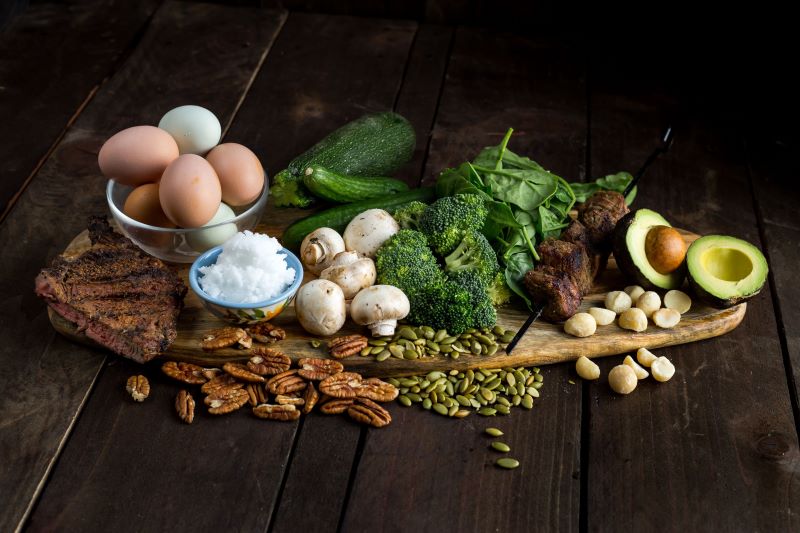
Energy-rich foods are a big part of thinking about what to eat. It’s good to know that every high-energy food is different. They can be completely different in their nutritional value and what they do in our diet. Some high-calorie foods have a lot of necessary nutrients and healthy fats because these give long-lasting energy and support overall health.
Consider following this manual on high-calorie content dishes to make knowledgeable judgments and practice self-control, allowing yourself a wide range of them while still meeting your nutritional needs and health targets.

Table of Contents

What are Calories?
A calorie is a unit of energy. In nutrition, calories refer to the energy of foods and beverages that the body can use for various physiological functions, including metabolism, movement, and cellular processes.
Calories fuel the body, providing the energy necessary to sustain life and perform daily activities. Understanding calorie intake and expenditure is fundamental for maintaining a healthy balance and achieving fitness or weight management goals.
What are the Sources of Calories?
Calories come from three primary sources: carbohydrates, proteins, and fats. Carbohydrates are the body's preferred energy source in foods like grains, fruits, and vegetables. They are broken down into glucose, which fuels cellular activities and powers our muscles and brain.
Proteins, abundant in foods like meat, fish, eggs, and legumes, are essential for building and repairing tissues and supporting immune function and enzyme production. While the body can derive energy from proteins when needed, its primary role is structural and regulatory rather than as a fuel source.
Fats, found in oils, nuts, seeds, and fatty animal products, are the most concentrated source of calories. They provide insulation, cushioning, and energy storage, as well as supporting hormone production and nutrient absorption.
Top 53 Food Items High in Calories
Discovering foods rich in calories can benefit individuals seeking to meet their energy needs or aiming for weight gain. Below is a category-wise list of calorie-dense foods across various categories to assist you in making informed dietary choices.
List of Calorie Rich Vegetables
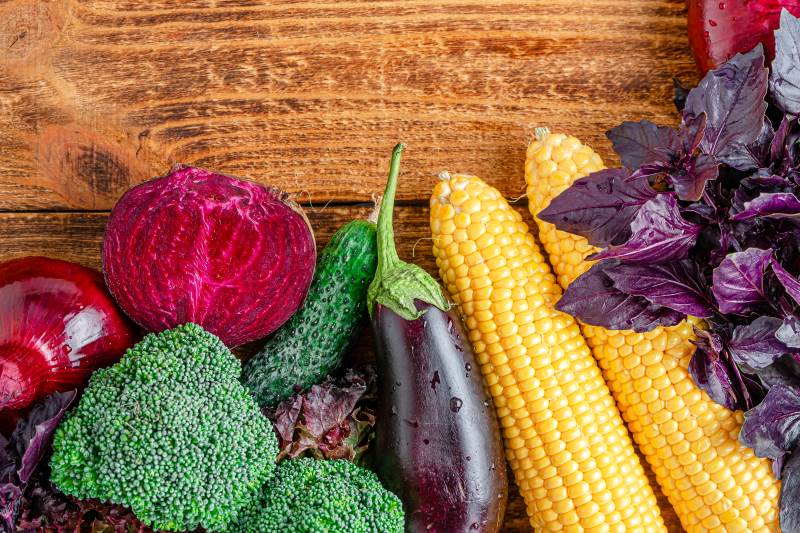
Vegetables not only offer essential vitamins and minerals but can also contribute to calorie intake. Below is a list of calorie-rich vegetables along with their calorie content:
SNo. |
Vegetables | Description |
| 1 | Chickpeas | Chickpeas, rich in protein, fibre, and iron, provide 269 calories per cooked cup. |
| 2 | Edamame | Edamame is rich in protein, fibre, and vitamins K and C, providing 188 calories per cooked cup. |
| 3 | Acorn Squash | Acorn squash is high in fibre, vitamins A, C, and B vitamins, providing 115 calories per cooked cup. |
| 4 | Sweet Potato | Sweet potatoes are rich in vitamin A, vitamin C, manganese, and fibre, offering 180 calories per cooked cup. |
| 5 | Potato | Potatoes are high in vitamin C, vitamin B6, potassium, and fibre, providing 163 calories each. |
| 6 | Avocado | Avocado is high in healthy fats, fibre, and various vitamins, providing 240 calories each. |
| 7 | Corn | Corn is high in B vitamins, magnesium, and phosphorus, providing 177 calories per cooked cup. |
| 8 | Parsnips | Parsnips are rich in fibre, vitamin C, folate, and manganese, providing 111 calories per cooked cup. |
| 9 | Beets | Beets are high in fibre, folate, and vitamin C, providing 75 calories per cooked cup. |
| 10 | Broccoli | Broccoli is high in vitamins C, K, and fibre, providing 55 calories per cooked cup. |
| 11 | Pumpkin | Pumpkin is high in vitamins A, C, E, and potassium, providing 49 calories per cooked cup. |
| 12 | Carrots | Carrots are rich in beta-carotene, vitamins A, K, and B6, offering 55 calories per cooked cup. |
List of Fruits Rich in Calories
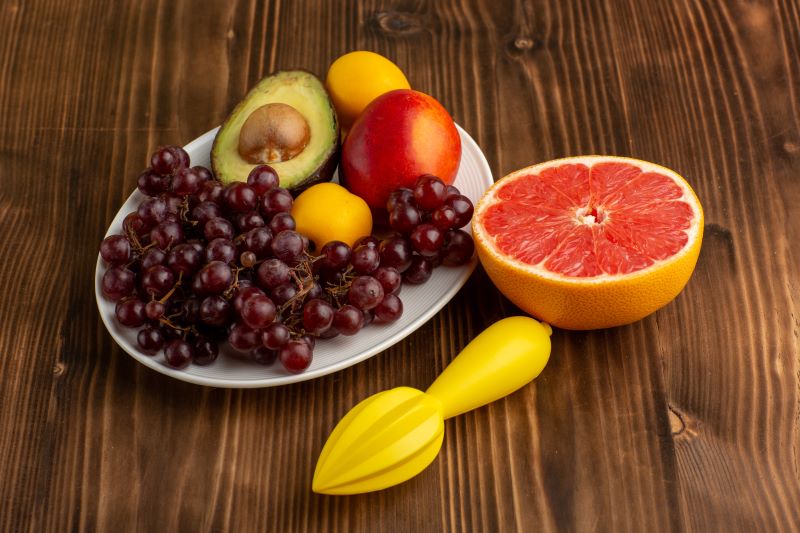
Some varieties of fruits are surprisingly high in energy. Whether you're looking for a quick energy boost or aiming to increase your calorie intake, the fruits mentioned below offer a delicious way to fuel your body:
SNo. |
Fruits | Description |
| 13 | Plantains | Plantains offer around 232 calories per cup of cooked slices. |
| 14 | Banana | Bananas are a convenient and versatile fruit, providing approximately 105 calories per medium-sized banana. |
| 15 | Mango | Mangos are sweet and juicy tropical fruits, offering about 200 calories per cup of sliced mango. |
| 16 | Blueberry | Blueberries are small, sweet, and packed with antioxidants, providing around 84 calories per cup. |
| 17 | Coconut | Coconuts are rich, creamy fruits with about 283 calories per cup of shredded coconut. |
| 18 | Pear | Pears provide approximately 101 calories per medium-sized pear. |
| 19 | Grapes | Grapes are sweet and refreshing fruits, offering approximately 62 calories per cup. |
| 20 | Durian | Durians are large, spiky fruits with a strong odour and rich flavour, providing about 357 calories per cup of diced durian. |
| 21 | Custard Apple | Custard apples are creamy and aromatic fruits, offering about 235 calories per 250 g of serving. |
| 22 | Papaya | Papayas are tropical fruits with a sweet and musky flavour, providing around 120 calories per medium-sized papaya. |
| 23 | Guava | Guavas are tropical fruits with a unique flavour and fragrance, offering approximately 112 calories per cup of sliced guava. |
List of Cereals and Dairy Products Containing Calories
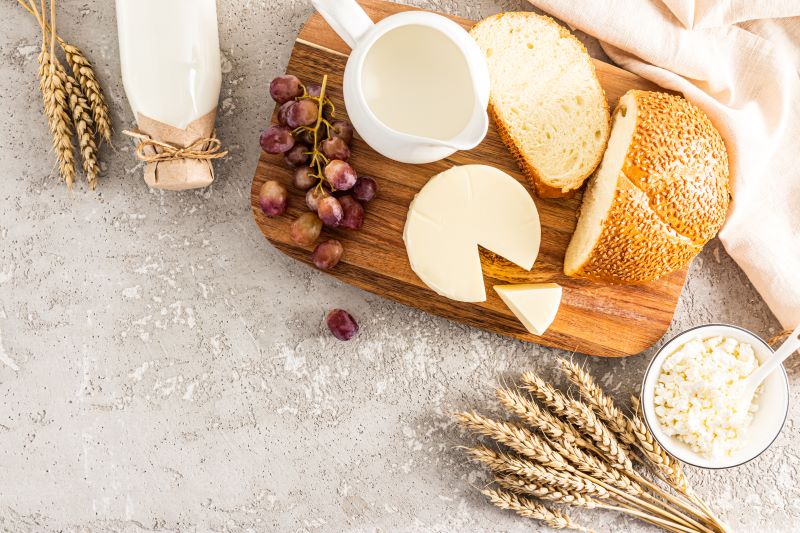
Cereals and dairy products are staples in many diets, providing essential nutrients and energy. For individuals looking to increase their calorie intake, the following cereals and dairy items offer a concentrated source of calories:
SNo. |
Item | Description |
| 24 | Brown Rice | Brown rice is a whole grain rich in fibre and provides approximately 218 calories per cooked cup. |
| 25 | Granola | Granola is a mixture of rolled oats, nuts, and sweeteners, offering about 597 calories per cup. |
| 26 | Ghee | Ghee, or clarified butter, is calorie-dense and provides around 112 calories per tablespoon. |
| 27 | Cheese | Cheese comes in various types, with cheddar cheese offering about 113 calories per ounce. |
| 28 | Condensed Milk | Condensed milk is sweetened and thickened milk, providing approximately 982 calories per cup. |
| 29 | Rice | Rice is a staple food and provides energy, with white rice offering about 205 calories per cooked cup. |
| 30 | Whole Wheat Bread | Whole wheat bread is a good source of fibre and provides approximately 69 calories per slice. |
| 31 | Oats | Oats are rich in fibre and provide approximately 150 calories per cooked cup. |
| 32 | Tofu | Tofu, made from soybeans, is a protein-rich food and offers about 94 calories per 3-ounce serving. |
| 33 | Greek Yoghurt | Greek yoghurt is high in protein and provides about 100 calories per 6-ounce serving. |
List of Seeds and Nuts Rich in Calories
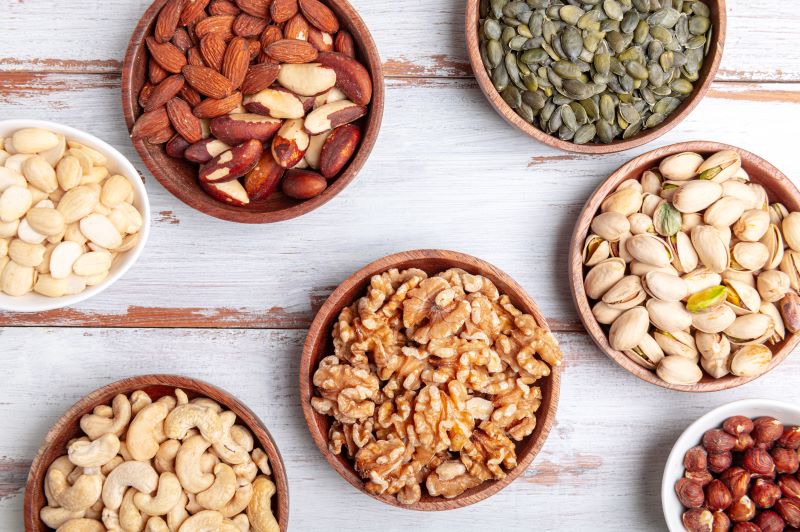
Seeds and nuts are nutrient-dense foods that provide a concentrated energy source, making them ideal snacks or additions to meals for those seeking to increase their calorie intake. Below are several seeds and nuts known for their higher calorie content:
SNo. |
Item | Description |
| 34 | Pecans | Pecans are rich in healthy fats and provide approximately 196 calories per ounce. |
| 35 | Pistachios | Pistachios are delicious and nutritious nuts, offering about 159 calories per ounce. |
| 36 | Walnuts | Walnuts are nutrient-packed nuts, providing around 185 calories per ounce. |
| 37 | Brazil Nuts | Brazil nuts are large and rich in selenium, offering approximately 186 calories per ounce handful. |
| 38 | Almonds | Almonds are crunchy and nutritious nuts, providing about 163 calories per ounce. |
| 39 | Sunflower Seeds | Sunflower seeds are a popular snack and provide approximately 166 calories per ounce. |
| 40 | Peanuts | Peanuts are protein-rich legumes and offer about 161 calories per ounce. |
| 41 | Cashews | Cashews are creamy and rich in healthy fats, providing around 157 calories per ounce. |
| 42 | Pumpkin Seeds | Pumpkin seeds are nutritious and provide approximately 126 calories per ounce. |
| 43 | Pine Nuts | Pine nuts are small and flavorful nuts, offering about 191 calories per ounce. |
| 44 | Macadamia Nuts | Macadamia nuts are creamy and rich in monounsaturated fats, providing approximately 204 calories per ounce. |
List of Animals and Seafood High in Calories
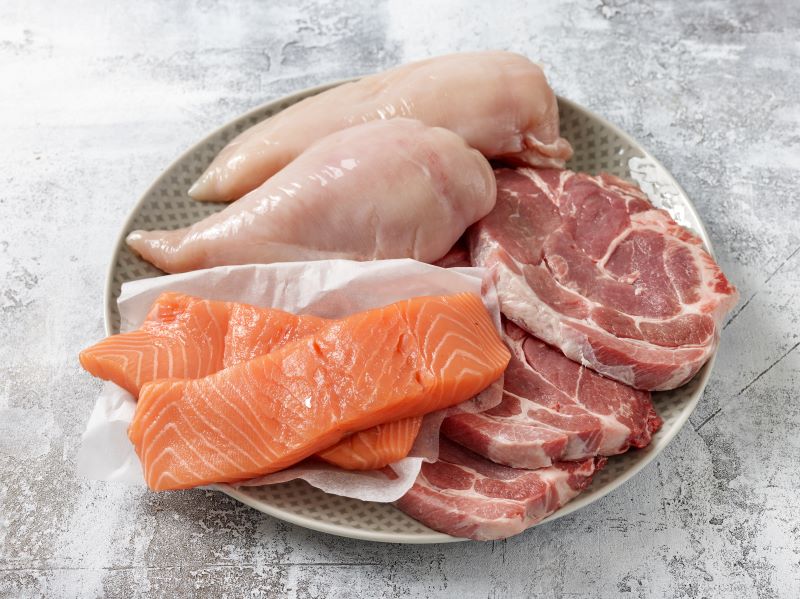
Certain animal proteins and seafood options also offer a substantial amount of energy. Here is a list of several animal proteins and seafood with high calories:
SNo. |
Item | Description |
| 45 | Salmon | Salmon is a fatty fish rich in omega-3 fatty acids and provides approximately 175 calories per 3-ounce serving. |
| 46 | Chicken | Chicken is a versatile and protein-rich meat, serving about 165 calories per 3.5-ounce cooked. |
| 47 | Eggs | Eggs are nutrient-dense and offer around 78 calories per large boiled egg. |
| 48 | Tuna | Tuna is a lean fish packed with protein and provides approximately 112 calories per 3-ounce serving. |
| 49 | Shrimp | Shrimp are low in fat and provide about 84 calories per 3-ounce cooked serving. |
| 50 | Sardines | Sardines are oily fish rich in omega-3 fatty acids, providing approximately 172 calories per 100g cooked serving. |
| 51 | Beef | Beef is a rich source of protein and provides approximately 213 calories per 3-ounce serving. |
| 52 | Lamb | Lamb is flavorful and provides around 250 calories per 3-ounce serving. |
| 53 | Pork | Pork is versatile and offers about 206 calories per 3-ounce serving. |
How Much Calories Should You Intake Daily?
Determining your daily calorie intake is crucial for maintaining a healthy weight and overall well-being. The calories vary depending on age, gender, activity level, and metabolic rate.
To help you determine your calorie needs, refer to the table below, which provides daily calorie intake recommendations by renowned institutes like Apollo based on age, sex, and activity level:
Daily Calories Intake For Men:
|
Age Range |
Calorie Requirements |
|
2-4 years |
1000-1400 kcal |
|
5-8 years |
1200-1800 kcal |
|
9-13 years |
1400-2200 kcal |
|
14-18 years |
1800-2400 kcal |
|
19-30 years |
2400-3000 kcal |
|
31-59 years |
2200-3000 kcal |
|
60+ years |
2000-2600 kcal |
Daily Calories Intake For Women:
|
Age Range |
Calorie Requirements |
|
2-4 years |
1000-1400 kcal |
|
5-8 years |
1200-1800 kcal |
|
9-13 years |
1400-2200 kcal |
|
14-18 years |
1800-2400 kcal |
|
19-30 years |
2000-2400 kcal |
|
31-59 years |
1800-2200 kcal |
|
60+ years |
1600-2000 kcal |
Calculate Your Health Metrics Instantly
Health Benefits of Including Calorie Rich Foods in Your Diet
Incorporating calorie-rich foods into your diet offers a myriad of health benefits owing to their dense nutritional profile. These foods provide energy, support various bodily functions, and promote well-being.
As per National Health Services and other sources, here are some well-researched advantages of including calorie-rich foods in your daily meals:
Different Ways to Include Calorie Rich Foods in Your Diet
Incorporating calorie-rich foods into your diet doesn't have to be complicated. Creativity and planning allow you to easily include these nutrient-dense foods in your meals and snacks. Here are some simple and effective ways to add calorie-rich foods to your diet:
What are the Symptoms of Calorie Deficiency?
Recognising the signs of calorie deficiency is essential for maintaining overall health and well-being. Here are some common symptoms that may indicate a calorie deficiency:
- Fatigue and Weakness: Feeling constantly tired, weak, or lazy can indicate insufficient calorie intake. Calories provide the energy needed for everyday activities, and a deficiency can leave you feeling drained and exhausted.
- Unintentional Weight Loss: Unexpected or unexplained weight loss can occur when calorie intake is consistently lower than the body's energy needs. This may result in a decrease in muscle mass and overall body weight.
- Poor Concentration and Brain Fog: Inadequate calorie intake can affect cognitive function, leading to difficulty concentrating, memory problems, and brain fog. The brain requires a steady supply of energy from calories to function optimally.
- Mood Changes: Calorie deficiency can impact mood and emotional well-being, leading to irritability, anxiety, or depression. Calories play a role in producing neurotransmitters that regulate mood; a shortage can disrupt this balance.
- Reduced Immune Function: Insufficient calorie intake can weaken the immune system, making you more susceptible to infections and illnesses and slow recovery. Calories are essential for supporting the immune response and maintaining overall health.
- Hair Loss and Skin Problems: Calorie deficiency can affect the health of your hair, skin, and nails, leading to dryness, dullness, hair loss, and brittle nails. Adequate calorie intake is necessary to support these tissues' growth and repair.
- Hormonal Imbalances: Calorie deficiency can disrupt hormonal balance in the body, leading to irregular menstrual cycles in women, decreased libido, and changes in reproductive health. Calories are crucial for hormone production and regulation.
What are the Health Risks of Not Getting Enough Calories?
More calorie intake can pose significant health risks and lead to various complications if addressed. Here are some health risks associated with calorie deficiency:
It can result in nutritional imbalances, impacting overall health and vitality.
This may lead to the breakdown of muscle tissue and reduced physical strength.
It can weaken the immune system, increasing susceptibility to infections and illnesses.
Cognitive function may be impaired, affecting memory, concentration, and mental clarity.
Metabolic rate may decrease, making it harder to maintain a healthy weight and manage body composition.
Hormonal disruptions can occur, affecting various bodily functions.
Chronic calorie deficiency is associated with an elevated risk of developing chronic conditions like cardiovascular disease and type 2 diabetes.
Fatigue and low energy levels are common symptoms of calorie deficiency.
What are the Side Effects of Excessive Calorie Intake?
While calories are essential for energy and bodily functions, overconsumption can lead to various side effects. Here are some side effects of excessive calorie intake:
Excessive calories lead to weight gain, increasing the risk of obesity-related issues.
Raises blood sugar levels, risking insulin resistance and type 2 diabetes.
Elevates cholesterol, heightening cardiovascular disease risk.
Strains digestion, causing discomfort and gastrointestinal problems.
Excessive calories from unhealthy sources worsen nutritional status and induce deficiencies.
This leads to fatigue as the body struggles to manage excess energy.
Chronic overeating impacts mental health, fostering feelings of guilt and dissatisfaction.
High-calorie, low-nutrient foods increase the risk of chronic diseases like cancer.
Should You Take a Calorie Supplement?
Deciding whether to take a calorie supplement depends on individual needs and circumstances. While some individuals may benefit from calorie supplements to meet increased energy demands or support weight gain goals, others may not require them and can obtain sufficient calories through diet alone.
Additionally, relying solely on calorie supplements without addressing underlying dietary and lifestyle factors may not be effective or sustainable in the long term. It is crucial to focus on consuming a balanced diet rich in nutrient-dense foods and engaging in regular physical activity to support overall health and well-being.
Understanding the importance of calorie-rich foods in our diet is paramount for maintaining optimal health and well-being. The above nutrient-dense foods provide essential energy and support vital bodily functions, ensuring your bodies function optimally.
Incorporating various calorie-rich foods into our meals and snacks can meet our energy needs, support muscle growth and repair, and promote overall vitality. Remember to prioritise nutrient-rich options and maintain a balanced diet to reap the benefits of calorie rich foods for long-term health and wellness.
Protect What Matters - Explore Other Insurance Options














